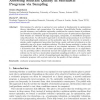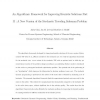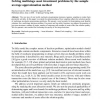29 search results - page 1 / 6 » Assessing solution quality in stochastic programs |
MP
2006
13 years 4 months ago
2006
Determining if a solution is optimal or near optimal is fundamental in optimization theory, algorithms, and computation. For instance, Karush-Kuhn-Tucker conditions provide necessa...
CP
2004
Springer
13 years 10 months ago
2004
Springer
The success of stochastic algorithms is often due to their ability to effectively amplify the performance of search heuristics. This is certainly the case with stochastic sampling ...
CCE
2004
13 years 4 months ago
2004
The algorithmic framework developed for improving heuristic solutions of the new version of deterministic TSP [Choi et al., 2002] is extended to the stochastic case. To verify the...
MP
2006
13 years 4 months ago
2006
The vast size of real world stochastic programming instances requires sampling to make them practically solvable. In this paper we extend the understanding of how sampling affects ...
ANOR
2006
13 years 4 months ago
2006
Abstract. We investigate the quality of solutions obtained from sample-average approximations to two-stage stochastic linear programs with recourse. We use a recently developed sof...



